Homoerotic Spirituality
Posted On Friday 23 October 2009 at at 14:28 by Terence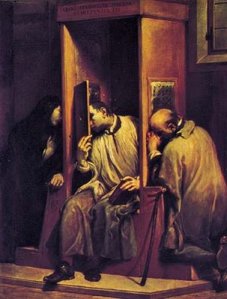
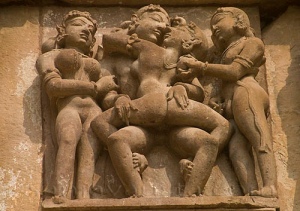
Shocked? Well, get over it.
Anyway, it’s really not such an outlandish idea - even for Catholics (actually, especially for Catholics!). I mean, if you’re going to dismiss what I’m suggesting, then you’d better be willing to also dismiss any number of saints and their highly erotic experiences of the sacred.
Erotic experiences of God?! (Okay, if you’re still shocked maybe this blog isn’t for you.) But seriously, I appreciate the perspective of Jean Houston, who points out that: “Eros has a mission with the soul. Without Eros, the soul cannot grow; the psyche remains infantile. Eros gives psyche its yearning, its impetus, its desire for the fullness of life.”
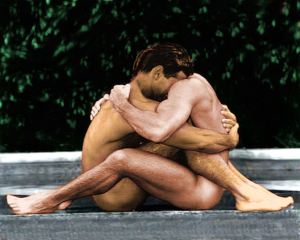
"Of course as a gay man, (Michael writes) the thing that appeals to me most about John’s poem is that it depicts his lover as another man:
(from ) On a Dark Night
........
........
"Oh, night that guided me,
Oh, night more lovely than the dawn,
Oh, night that joined
Beloved with lover,
Lover transformed in the Beloved!
Upon my flowery breast,
Kept wholly for himself alone,
There he stayed sleeping,
and I caressed him,
And the fanning of the cedars made a breeze.
The breeze blew from the turret
As I parted his locks;
With his gentle hand
He caressed my neck
And caused all my senses to be suspended.
I remained, lost in oblivion;
My face I reclined on the Beloved.
All ceased and I abandoned myself,
Leaving my cares
forgotten among the lilies."
[caption id="attachment_1936" align="alignleft" width="115" caption="Gay Spirituality"]
 [/caption]
[/caption]At Nihil Obstat, Censor Librorum has posted without comment two versions of the ad campaign for "Catholics Support Condoms". Leaving aside (for now) the issue of the condoms, what caught my attention was the first two lines in the copy:
"We believe in God.
We believe that sex is sacred."
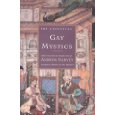
[caption id="attachment_1938" align="alignleft" width="150" caption="Seduced by Grace: Michael B Kelly"]
 [/caption]
[/caption]He too pointed to the rich vein of the erotic in traditional mystical writing, referring also to St Theresa and St John of the Cross in particular , using as illustration the same poem as that posted on the Wild Reed. He also discussed the obvious fact that far too much of the Church's writing and teaching on sex has been done by "celibate men in frocks", who self-evidently either had no practical experience, or were unable to disclose any that they had. To counter this, it is important that we as laity need to speak much more frankly about sex. There was much more, but I will not go into the rest in this post: he deserves a full analysis later, which I am working on. I do, though, want to point out his central point: while it is clear to many that erotic experience (including gay men's experience) is valuable in spirituality, this has received limited recognition or scholarly attention. He is currently engaged in doctoral research, using personal stories as raw material. He urges us all to speak out openly and frankly of our own experiences, to bring the truth to wider attention. This is a sentiment I heartily endorse. I have promised to send to Michael my own stories, and urge my readers to do the same. (If you want to take me up on this offer, just post a brief comment, and I will send you an email address, if you do not have an alternate access)
More books on lesbian & gay spirituality:
Boisvert: Out on Holy Ground
Glaser: Coming Out to God
Glaser: Coming Out as Sacrament
Harvey, Andrew: Essential Gay Mystics
Helminiak: Sex and the Sacred
Johnson, Toby: Gay Spirituality
Kelly: Seduced by Grace
Mattman, Urs: Coming in
McNeill: Sex as God Intended
O'Brien, Glen: Praying form the Margins
The Intimate Dance of Sexuality and Spirituality
Posted On Wednesday 2 September 2009 at at 14:29 by Terence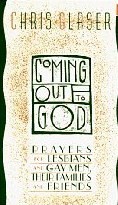

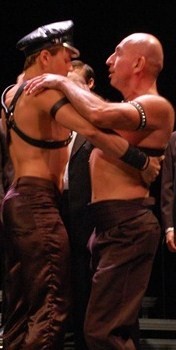
"When my sexuality began to emerge, my spirituality froze in fear, then nearly ran out of the room. But then it noticed other souls dancing gracefully, and realised it was missing their grace. My spirituality wondered if the lack of grace had something to do with rejection of the stranger on the other side of the room, my sexuality.
Timidly, one invited the other to dance. At first, they scarcely looked at each other… they were lousy dancers. Then they cast furtive glances at each other, sometimes angry or resentful, sometimes flirtatious and seductive….Finally they found times when the dance led them, and for brief moments they became perfect dancers, full of grace, true to each other. They danced together as my soul."
"Sexuality and spirituality are not opposing forces, as is frequently supposed today. Instead, both draw people into relationship. Sexuality draws us into physical relationships: touching, hugging…… kissing and intercourse. Spirituality draws us into relationships that both incl ude and transcend bodies because it includes and transcends that which is visible……Both our sexual and spiritual powers are holy, and therefore both my be profaned. At their holiest, these powers lead to love in all its many expressions. At their most profane, they may lead to apathy or hate. The integrity of both sexual and spiritual powers is called the soul."
"In prayer, coming out to God as sexual-spiritual beings opens us up, I believe, to God coming out to us in the dance of Substance and Sensuality, spirituality and sexuality. Prayer becomes a place wherein the choreography of the dance of spirituality and sexuality gets worked out. When we allow the Lord of the Dance to lead, sexuality becomes responsible and spirituality becomes responsive."
My Homoerotic Retreat: Six days that changed my life.
Posted On Monday 13 July 2009 at at 07:10 by Terence(In offering the story below, I do so with some trepidation. I know that many readers will be sceptical or cautious, may even find it ridiculous. I myself, given my particular background in faith and religious temperament, would have been made distinctly uncomfortable if any of my friends had asked me to take such a story seriously. Still, I think it is time to share it. I leave you to decide for yourself: was this a genuine mystical experience, as my eminently well qualified spiritual directors believed? Or was I just suffering from some kind of spiritual delusions of grandeur? Make up your own mind.)
During Advent of 2002, I underwent a 6 day directed retreat which turned out to be the most extraordinary spiritual, even mystical, experience of my life, which in certain key respects fundamentally changed my outlook on faith.
Background & Context
As the experience really was remarkable, sounding like an account that I myself would previously have dismissed as ramblings from the sentimental / superstitious wing of Catholicism, I want to begin by setting out my prior religious / spiritual background, as well as the context in which I began my retreat. This will provide both context and contrast for what followed.
After drifting away from the church during my twenties as a married man, I later came out as a gay man. Ironically, it was only after setting up in a committed long gay relationship that I was moved to return to the church. The parish I then joined was led by Jesuit priests, and in time I began to explore the Ignatian approach to spirituality, by way of increasingly heavy involvement in the CLC – “Christian Life Community”. In spite of this involvement, I did not see myself as particularly “religious” (a word I detest), nor “spiritual”, with all its connotations of “piety” and mysticism. I simply knew that I enjoyed profound satisfaction in setting aside time for quiet reflection on my life. My take on all matters of faith was primarily cerebral. (I was distinctly uncomfortable with the more ostentatious displays of images and relics, of novenas and special prayers “guaranteed” to bring results, or of mystical voices and apparitions.) I did, however, find value in the Jesuit emphasis on balancing the promptings of head and heart, and on the value of paying attention to experience. I became of convinced of the truth that Prayer is not just about speaking to God asking for favours, but also of attempting to listen. I knew that by proper attention to the discernment of spirits within, one could, with care and imperfectly, hear the voice of the Lord speaking directly to us.
The context for this retreat was that after a long period of careful discernment, my partner and I had taken the important decision to leave South Africa, the only country I had ever known, to take up teaching posts in the UK – a country which I had never even visited. This was to be my final Christmas in South Africa, and the decision lay heavy on my mind. I was also reoccupied with the nature of my gay relationship. I had repeatedly considered the issue of homosexuality in prayer and under spiritual direction, and was comfortable that there was nothing immoral or reprehensible in our relationship. Still, I was just a little bothered by the possibility that perhaps after all, I was fooling myself, making excuses and rationalising away some inner doubt. So I was looking for final reassurance on two key questions in my life: the decision to emigrate, and my status as a sexually active gay man in the church.
Coming Out as Spiritual Experience
Posted On Thursday 2 July 2009 at at 13:56 by Terence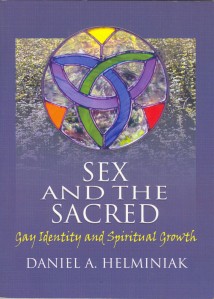
"Coming Out" as Wrestling with the Divine
Posted On Tuesday 30 June 2009 at at 13:53 by TerenceAt this time of Pride, marking the 40th anniversary of Stonewall, I wanted to post something on the important legacy of visibilty and coming out.
After mulling over some thoughts on what to say, I picked up Richard Cleaver's "Know My Name" for re-reading, and was delighted by the synchronicity of finding that his Chapter 2, "Knowing and Naming", deals with exactly this subject. So instead of rehashing or expanding the ideas I presented in my opening post 6 months ago ("Welcome: Come in, and Come out"), I thought I would share with you some of Cleaver's insights.
First, Cleaver points out that in addition to the modern association of "coming out" with escaping the closet, there are two other important contexts. It can also call to mind the Exodus story of coming out of the land of Egypt, of escaping slavery and oppression; and it was used before Stonewall to mimic the English debutante ritual of "coming out" into society, of achieving the first recognition as an adult in polite society . For us then, coming out is both a liberation from oppression and an acceptance and a welcome into a new society. He then continues by arguing that coming out in the modern sense is an essential first step in hearing the Gospel message of liberation .
To do so, he points to the well-known costs of nto coming out: psychological self-oppression, increased suicide risk (especially in the young), and the arrests for sexual activity in restrooms / cottages of men who are usually married or otherwise closeted. Against that, he contrats the perosnal rewards of coming out. After speaking the truth to ourselves, the next stage, of meeting with others like ourselves,
"is generally even more of a transforming moment than the private recognition and acceptance of our gayness....Coming out publicly (a continuous process, not a single event) brings a sense of freedom that must be experienced to be believed. Coming out is one of our many seasons of joy."This is a sentiment which, from my own experience, I heartily endorse, and to which I would add the observation that "Joy is an infallible sign of the Holy Spirit."
He then turns to some possible costs of coming out: active discrimination, including in employment; difficulties in securing adequate access to children; a misguided steering into inappropriate marriage, in the expectation of a 'cure'; and finally the hostility or even misguided interference of the churches. This leads to a stinging repudiation of the Church's involvement:
"It is no surprise that whether we leave or stay, we react to the church with suspicion. Something about what the church is teaching, something about how the church conceives itself, is not right. In the case of the church's relation to gay men and lesbians, we can dissect out two particular explanations for this suspicion.To which I add once again that this is why I am convinced we need to be out and visible in the church. As long as we remain closeted and out of sight, as long as we refrain from speaking of our own experiences, we are complicit in our own oppression.
First, the church has allowed itself to subordinate the commandment of love to the demands of heterosexist culture, defying Paul's injunction, "Do not be conformed to this world, but be transformed by the renewing of your minds." (Rom 12:2) ......It is.. the result of the church's long-standing obsession with sexual activity, which leads to a reduction of the lives of lesbians and gay men to the realm of sexual experience."
"This brings me to my second suspicion about the church, which is why it is willing to accmomodate itself to the mind of the age, to compromise with bourgeois culture: it hopes to maintain its authority and thus its institutional power in society by preventing lesbians and gay men from speaking about their own experiences. The institution benefits.. from a theology that permits it to hand down decisions without any data even being collected, let alone examined". (Emphasis added).
Cleaver then goes on to discuss several well-known Gospel stories, drawing from them important lessons for us in the LGBT community.
Reflecting on the story of the Samaritan woman at the well, he avoids some of the better known observations, and makes two other points. He notes that while recognising her sexual noncomformity, Jesus notably does not admonish or condemn her, nor does she express repentance.
"Jesus is no welfare caseworker... his goal is to transform society, not to 'fix' those who suffer injustice so that the existing social order may run more smoothly."The second point is that after the initial exchange, the woman proceeds to put to Him some "theological" questions on worship. The story, notes Cleaver, is not about promiscuity at all, but about "who is capable of doing theology" .
This point on doing theology is made again when he looks at the story of Mary and Martha (Luke 10). While Martha works, Mary sits and listens to Jesus speak. Mary complains, but the reply is that Mary "has chosen the better part". In Jewish society, women were expected to do the domestic work, only the men participated in religious study or debates, and the sexes sat apart when guests were present for meals. It would have been unheard of for women to participate in religious discussions, yet Christ not only condones this, he commends her for it. Jewish women and other social outcasts were expected to be invisible: but for the Lord, no-one is invisible, all are welcome to join in making theology.
In telling of the story of the rich man and Lazarus (Luke 16:19 -31), Cleaver compares Lazarus with the LGBT community "outside the door" of the church, while the rich man is compared with the institutional church, which even by its indifference contributes to our oppression.
His final biblical reflection is an extended discussion of Jacob's wrestling with the angel at Peniel (Gen 32: 22-32). For Cleaver, there arae two important themes in this story: the wrestling itself, and the act of naming. From this he reflects on the importance to us of naming honestly our oppression. Noting that
"We learn to name our oppression by struggling with it",he insists that we should present ourselves in full frankness and honesty, implying that we should resist the temptation to mimic conventional patterns of morality out of a mere desire to avoid offence:
"The strategy of putting forward only "acceptable" images of ourselves is doomed to failure... We should be forthright about who we are."For me, the 3 key lessons from Cleaver, all of which I endorse whole-heartedly, are:
In spite of the obvious dangers and costs, coming out publicly is invigorating, liberating and life-giving;
We need to extend the "coming out" process into our lives in the Church, where we should expect to be fully visible, and to speak out frankly and honestly of our views and experiencces;
and that by doing so, we will be exercising our right to share in making theology, in spite of the efforts of the institutional church to exercise a monopoly.
"We must speak with our own voices, in all their imperfections, when responding to God's overtures. Moses stuttered; Israel limped. What matters is not image but inegrity. If God calls, we must know who answers. We answer to our true names, because these are the names God calls us by. The cost of learning them is wrestling with the divine."Amen to that.
Seduced by Grace: Michael B Kelly
Posted On at at 13:30 by TerenceMarriage Equality & the Church.
Posted On Friday 29 May 2009 at at 13:23 by TerenceCatholic 'Dissent'
Posted On Wednesday 11 March 2009 at at 13:20 by TerenceAs a child in Catholic primary schools, I vividly remember memorising, page by page, the catechism of the church: first a slim little red version, later a slightly fatter grey-green version for older students.
"Who made you? God made me."
"Why did God make you? To know Him, to love Him, to serve Him in this world, and to be happy with Him forever in the next."
But by the time I reached secondary school, Vatican II was in progress, enthusiastically embraced by the preist who taught me RE for the next 5 years. I never again saw that little catechism.
There is a quaint view in some quarters  that to be a Catholic requires that one suspend all powers of the intellect, and meekly agree to believe, and to live, exactly as one is told. This view I emphatically reject. One of the key parables in the Gospels is that of the 10 talents. We are taught that the Lord requires us to use all the talents we are given, for his greater glory and to further His reign on earth. Surely the intellect is one of the greatest talents He has bestowed on us? (Another is our sexuality, which should also be used - but that is another story.)
that to be a Catholic requires that one suspend all powers of the intellect, and meekly agree to believe, and to live, exactly as one is told. This view I emphatically reject. One of the key parables in the Gospels is that of the 10 talents. We are taught that the Lord requires us to use all the talents we are given, for his greater glory and to further His reign on earth. Surely the intellect is one of the greatest talents He has bestowed on us? (Another is our sexuality, which should also be used - but that is another story.)
Michael Bayley, at The Wild Reed, writes an impressive blog from what he calls a 'progressive, gay, Catholic perspective.' I am a regular reader, admiring in particular the way he has of presenting not only stimulating personal views, but also the best of writing from a range of others. He also has excellent cross-references and links, so that I find that his archives alone are worth spending hours on, to explore specific themes. But in yesterday's post, he shares a letter he has received from a reader who states that
"this blog is just an exercise in false advertisement. For while you may in fact be progressive and gay, you are most definitely not Catholic."
In making this assertion, the writer cites as evidence Michael's regular criticisms of the hierachy, his occasional writings on other faith traditions, and on some of his other activities, such as the work of the Spirit of St Stephen's. The comment boxes at the Wild Reed have been filling rapidly, with readers rushing to Michael's defence. I made my own response there, so I do not intend to elaboratae further on Michael, and my support for him. (Go to the Wild Reed yourself. Read the interchange, the recent posts which led to it, mull over the comments. But also explore his valuable archives on dissent, and on what it means to be a Catholic).
What I do want to do here is to explore some of my own reflections on this interchange, as it affects me and this blog.
Ever since the approach of Lent, I have been struggling to get my thoughts down on the keyboard, and this is part of the reason. I have never been one to see Lent as primarily a time of sacrifice: rather, it is for me a time of refelction, in preparation for the great feast of the Easter resurrection. My reflections this year have left me wanting to resolve some personal issues in developing a closer relationship with my local parish and diocese. These do not lend themselves to public writing.
Furthermore, in setting up this blog in the first place, it was neve my intention to devote it to reflexive, incessant attacks on the established church. This is what I wrote in my founding statement:
"....to all you who are gay Catholics or lapsed Catholics, a plea and invitation: come in and come out. If you have lapsed, come back in to the Church, and help to make a difference. If you remain a regular churchgoer, come in deeper - take on more active ministry. Let there be no doubt of your credentials as Catholic. Then, cautiously and gradually, come out as gay
........ Coming out in the church will be more difficult, so you will need even more support. I hope that this site will help you to find a suitable support network for face to face contact and discussion. But the virtual society of the blogosphere can also represent support of a kind - and that, we definitely aim to provide."
My track record since then has been less balanced. (Unfortunatley, simple responding to current news has left me with little choice. ) Still, I am mindful that my intention from the start was to focus on the 'Good News' that is inherent in the Gospels, in the gift of our sexuality, and in the great tradition of the Catholic Church.
So, the debate at the Wild Reed has brougth into focus how I can (belatedly) reflect in this blog, part of my own Lenten resolution. For the next few weeks, I will be attempting to present a more positive view of the Church which, for all its failings, remains my spiritual home.
Reaffirming Vatican II: We are the Shepherds
Posted On Thursday 19 February 2009 at at 12:42 by TerenceAfter writing earlier this week about Bishop Robinson's book on power and abuse in the church, with its reflections on the attempts at Vatican II to re-balance the power structures, I was interested to find in quick succession two items which between them shed some light on the problem. And the answer, I suspect, lies not with 'them', but with 'us'.
First,the more seemingly frivolous item: a report in New Catholic Times (sensus fidelium) on a novel, "Waiting for Mozart", by Chuck Pilon, set in a Catholic parish 25 years after the conclusion of Vatican II. "Less than and somewhat more than" a review, it is John Quinn's reflections that I found particularly insightful. Let me quote from Quinn's review /reflection:
***
"In Chapter 2 of Waiting for Mozart, Fr. Joe Burns is described thus
"A fine priest...Ordained before Vatican II but known for aggressive application of its directives.
In those couple of sentences we have the story of Waiting for Mozart captured.
"Ordained before Vatican II", so socialized by a Catholic world-view radically different from that articulated by the council.
Joe was "known for aggressive application of its directives." His was the responsibility of ‘applying" the directives of the council. This he would do "aggressively."
And it was "directives", that is something given him to implement, to put into operation.
***
Quinn goes on to describe an incident from his own parish experience,
Holy Spirit at Work? - James Alison
Posted On Wednesday 18 February 2009 at at 13:03 by TerenceIn a penetrating article on his website, noted theologian James Alison examines the recent furores in the Church over matters gay, and reaches what he calls a 'suprising' conclusion. There is a huge amount of meat in here, which requires long and deliberate chewing (as always with Alison), so I cannot attempt to cover it all, certainly not after just one read. It is though, an important and hopeful post,
Church, Power &; Abuse
Posted On at at 12:45 by TerenceDepressing church news over the past two months has led me to pick up and start reading a book which has been on my shelves some time, but which I have previously only dipped into. The removal of excommunication of SPXX members has received wide and ongoing publicity; clerical sexual abuse is again in the news with the FBI reopening old investigations in LA Diocese, and fresh revelations over Fr Marcial Maarciel Delgado of the Legionnaires of Christ. Meanwhile, on the progressive wing of the church, there has been less coverage in the MSM of the silencing or excommunication of the priests Fr Roger Haight, Geoffrey Farrow and Roy Bourgeois, or of bizarre goings-on in the parishes of St Mary's, Brisbane and St Stephen's, Minneapolis, where attempts to muzzle complete parishes have led to resistance (St Mary's) or exodus (St Stephen's).
What all these have in common is that they are concerned with power in the church - its extension, its abuse, or attempts to defy or resist it. so I picked up again "Confronting Power & Sex in the Catholic Church", by Bishop Geoffrey Robinson. I am pleased that I did. Published in 2007, this book has much to say that is directly relevant to current events. Although I have not yet finished reading, and this is far from a formal review, I have already found much of value that I thought would be worth sharing.
Bishop Robinson was Auxiliary Bishop of Sydney from 1984, and in 1994 was appointed by the Australian Bishops to a position of leadership in the Australian church's response to revelations of sexual abuse. Following his retirement in 2004, he felt freer in speaking his mind, leading to the publication of this valuable book.
Even in his introduction, he wastes no time in setting out immediately his key thesis, that there are three interlinked causal factors which can lead to sexually abusive behaviour: an unhealthy psychological state, unhealthy ideas about power and sexuality, and an unhealthy environment or community. In its institutional structures, argues Robinson, too easily and too often reinforces or even creates conditions that reinforce these unhealthy conditions. It is easy enough to see the broad argument as it applies to sexual abuse, about which many others have written, and which I do not intend to elaborate. But it is the central section of the book where he spells out the nature and expansion of church institutional power, that fascinated me.
In a very brief summary of the history of the papacy, he shows how an institution which began as just one Bishop of a single diocese, albeit a most important one, moved from a position of 'first among equals' to one of dominance. Even then, for most of two millenia, the role of the Pope was one of guidance and co-ordination, not one of control. Not until Pius X and the First Vatican Council, with its promulgation of the doctrine of infallibility, did 'the doctrine of universal jurisdiction of of the Pope over every aspect of the Church' become established. It is against this longer term view of Church history that we need to evaluate Vatican II, which is now attracting so much welcome attention. Quite contrary to the view of the Lefevbrists and other conservatives in the church, Vatican II was significant not for overturning tradition, but for seeking to re-establish it. (This same point was made last week on Bilgrimage, where William D Lindsay wrote his own helpful piece on the meaning of Church and tradition in the context of the two Vatican Councils. It is unfortunate that most of us are so conscious of Vatican II and its upheavals, that we lose sight of Vatican I and the many councils before it.) Helpfully for Pius X and his successors, his attempts to establish universal control were greatly enhanced by the advances in communication technology, enabing him to be quickly informed of events in far flung parts of the world - and to communicate his response, desires and commands as quickly.
What Robinson recommends is not the abolition or destruction of Papal power - he notes that the Protestant faiths which have eliminated central authority ahve seen endless continuing fission within themselves - but a restoration of balance. A partnership between Pope, the college of Bishops, and laity not only reflects the (unfilled) promise of Vatican II, it also restores the earliest traditions of the Church, reflects established constitutional principles in secular democracies of a balance of power. The challenge in achieving this restoration in balance is that teh excessive power structures that have been built up are not simply the work of mischievous individual Popes and scheming officials. Rather, tehy have become institutionalised, built right into the 'systme' of Church governance, so that it is unremarkable that the autocratic structures began to re-establish themselves after the immediate enthusiasm following Vatican II. I have yet to read Bishop's Robinson's views on how this re-establishment of balance is to achieved, but have one thought of my own.
I find it striking that Luther's first great challenge to the abuse of power in the Church, and the unfolding Reformation that followed, were greatly aided and fuelled by the expansion of literacy and publishing, with the demand of the laity for access to the scriptures. In the preceding centuries, with limited access to literacy, manuscripts and a common literary language, it was inevitable that the Church would retain a virtual monopoly on knowledge in all its forms. With the widening of access to the tools of learning, it was natural that a widening circle of laity would demand access to at least some of that. The church's intransigence led to rebellion, and the the Protestant churches immediately were characterised by an emphasis on reading of scripture by all.
The Catholic Church eventually backed down on this, but still restricted higher studies in theology to priests. That too has now gone, and today there are more lay people studying formal theology than seminarians. The information age, and its rapid expansion of the tools of learning, has now taken access to theology outside the formal classroom. Knowledge is power. The expanding blogosphere empowers us all to extend our own knowledge. The more obvious it becomes that the officials of the curia do not have a monopoly on truth, the more we use the media available to us to voice our response to abuses (as we have witnessed over the last two months), the more obvious it will becomes to those at the top of the power structures that their 'power' is not after all as absolute as they might imagine. Then, by the grace of the Holy Spirit, they may at last begin listening as well as pronouncing, and they may again acquire Authority to accompany their power.
The Church's Changing Tradition.
Posted On Tuesday 10 February 2009 at at 13:05 by TerenceThe CDF famous (or infamous) letter "On the Pastoral Care of Homosexual Persons" makes the claim "Thus, the Church's teaching today is in organic continuity with the Scriptural perspective and with her own constant Tradition" , and later states "Scripture bids us speak the truth in love". This is the image that the established church so likes to proote - of an authoritative, unchanging tradition "speaking the truth" for all time. The image favoured by the church, howeer, is a false one.
In the context of current arguments about the papacy and its authority, it is worth recalling
"Sex As God Intended" (Book Review)
Posted On Monday 9 February 2009 at at 13:12 by TerenceI have just two small niggles about this book, so let me get them out of the way now. First, I was initally disappointed to find that this is not all new wrting by McNeill. Only half the book is by McNeill, and the rest is a collection of celebratory articles, a "Festchrift", by others. This Festschrift is welcome, but even his own writing is not all new. I have not read all the previous works, but even so I recognised large chunks of the material as not just a restatement, but verbatim reprints, of sections of "Taking a Chance of God." So big chunks of this are not new material.
Also irritating was the poor editing. McNeill appears to have gone to a new publisher, who have clearly made good use of a spell-checker - but paid insufficient attention to grammar. There were many instances where the flow of the text was interrupted by obvious missing words, with important parts of speech simply not present, leading to incomplete sentences or clauses that just did not hang together.
Celebrating John McNeill
But these were irritations only. It does not matter that this is not all new writing by McNeill, and should not be treated as such. The Festchrift is the clue: this is not a continuation, but a celebration, of the earlier work. Just running down the contributors, all of whom have made major contributions of their own to the continuing struggle of LGBT Catholics, is testimony to the importances of McNeill's work as theologian, as writer, and as therapist. (One of the contributions is titled "You saved My Life" this is intended to be taken quite literally). Amongst the contributors, I was already familiar with the work of Toby Johnson, Mark Jordan, Robert Goss, Sister Jeannine Gramick and Daniel Helminiak. The contributions of others has left me wanting to explore their work too.
So what is this life work of McNeill, and why should we celebrate it?
"The Church and The Homosexual", published back in 1976, was groundbreaking. Many writers since have testified to the liberating impact it has had on their own lives, and it has become a staple in the exploding bibliographies on the subject ever since. It was originally published with the blessing and 'imprimi potest' of his Jesuit order, but soon attracted the displeasure of the Vatican. Ordered to refrain from publication and teaching on the subject, McNeill initially complied, and fell silent for some years. In conscience though, he felt compelled to continue to write and to speak out. Like so many others, he left the priesthood and embarked on a precarious career as writer and psychotherapist. Subsequent books included "Freedom, Glorious Freedom", "Taking a Chance on God", and "Both Feet Planted Firmly in Midair."
"Sex as God Intended"
In the current book, McNeill examines systematically the treatment of sexuality, particularly in same sex relationships, and finds conclusions rather different to those usually used against us. As he and others have done before, he dismisses the old interpretation of the story of Sodom as a gross misinterpretation The sin of Sodom was not that of sexual relationships between men, but the failure to offer hospitality to guests - an important traditional obligation in a desert society. Where McNeill differs from so many other writers who have made the same point, is that he is not content to simply argue against the old 'clobber texts'. Rather, he goes further, arguing for the positive place of sexuality in the Old Testament. Highlighting Genesis 2 (the older version) rather than the more usual creation story in Genesis 1, he shows how Eve was created because Adam needed a companion, not just a mother for his children. This balances the procreative nature of marriage, so beloved by our opponents, with that of love and companionship.
An important piece of new writing in the book is a celebration of the Song of Songs, as a scriptural basis for sex as play. He also presents evidence that this may have been written to celebrate love been men. The gender of the protagonists, though is ultimately not important. The passion and ardour expressed is sufficiently powerful that the Song can be read with any interpretation you choose - but impossible to come away with the idea that sex is only about procreation.
Similarly, in examining the New Testament, McNeill's focus is on the positive messages for LGBT Christians, rather than a repetition of arguments against the clobber texts. He shows for instance, that in his family of choice, Jesus is associating with same sex groups rather than with 'traditional' family groups. His analysis of the healing of the (male) 'servant' of the Roman centurion shows how this servant was almost certainly a sexual partner, even lover, of the centruiion. He also draws attention to the special attentions paid to John the Evangelist as "the apostle whom Jesus loved." It has often been noted how Jesus in the Gospels has absolutely nothing to say about homosexuality. John McNeill has shown clearly that in His actions, the Lord goes much further than words in acknowledging and accepting such relationships.
Joy and the Holy Spirit.
The joy of McNeill's writing is always his emphasis on the positive. His recurring refrains are a quotation from St Irenaus "The glory of God is humans fully alive", an insistence that healthy psychology and healthy theology go hand in hand (and healthy psychology requires in turn healthy sexuality), and a strong underpinning of Ignatian Spirituality, in which we find God in all things - even in persecution and exclusion by the church. You can take McNeill out of the Jesuits, but you cannot take the Jesuits out of McNeill, and I thank the Lord for that.
Central to this thinking is that the Holy Spirit is constantly at work in our lives and in the world. In a context where official teaching on sexuality out of Rome is so obviously misplaced and psychologically unhealthy, it is too easy too lose one's spiritual bearings. McNeill reminds us that where Rome fails, the Holy Spirit is permanently at hand for guidance - we need only ask.
He goes further. In an important address to Dignity, reprinted in this book, he speculates on the active participation of the Holy Spirit in the church of today, directly intervening in a 'Kairos Moment ' to restore a proper balance between what has been the unbridled power of the papacy and the rest of the Church. (I am delighted that I have secured permission from McNeill to post this address in full on this blog, here.) At the time of writing, it was prescient. Given the turmoil in the church in recent weeks, and the resistance of so many to the series of Vatican fiascoes, I suspect we may now be seeing signs of just this intervention. As evidence, just see how Benedict has been forced to react to outrage over the most recent disaster concerning the SSPX by completing a nearly complete turnaround. What at one time appeared to be a slap in the face for the spirit of Vatican II has now become a firm endorsement of it!
This book may not contain significant new writing by John McNeill, but no matter. If you have not yet had the benefit of enjoying his exuberance, this will be an excellent introduction. If you have read the earlier books, then you should still buy it, read it, and circulate it, to join the celebration.
John McNeill, thank you.
The Value of Experience as Spiritual Self-Defence
Posted On Wednesday 4 February 2009 at at 13:09 by TerenceI referred yesterday to a post on Nihil Obstat in which Ned O'Gorman paints quite a depressing picture of the difficult position in which the established church puts us LGBT Catholics. He refers specifically to how some people enter heterosxual marriage to maintian some form of acceptance. As this goes directly to my own experience,
"Christianity is a Queer Thing" - Elizabeth Stuart
Posted On Saturday 10 January 2009 at at 12:03 by TerenceAs I went through Stuart's rundown of the leading figures in the development of Queer Theology, I found myself excited by the description of almost all, and planning on adding them to my 'Wish List', which I have now done. I thought I would share with you why. The notes below are super - brief descriptions of the key ideas that caught my interest, and the books, as reported by Stuart, that hold them.
Strangers & Friends (M. Vasey)
Vasey argues from an historical presentation of the sexuality and the family. He points out that far from being the 'tradtional' model, the family as idealised by modern Christians, especially the evangelicals, is a relatively modern invention. The gradual devlopment of this model as normative, has largely been responsible for the parallel development of a distinct gay identity, largely in reaction. (The campaign against the 'homosexual' is attacking what it has itself created.) Conversely, the early church idealised male friendship and community life, rather than the familyas now understood.
Sex and the Church (Rudy, Kathy)
Rudy also looks at the historical development of the family, from a feminist perspective. Her conclusion is that LGBT people are mistaken in looking to mimic heterosexual families, suggesting that urban gay male culture offers a model of human relationships modelled on community. She denies the argument that Christian sexuality needs to be procreative - Christianity reproduces itself not by procreation, but by conversion. What matters is not whether two people can produce children, but whether they can embrace outsiders - the key characteristic of Christianity.
Omnigender: A Trans-Religious Approach (Virginai RameyMollenknott)
Mollenknott shows that many features of God's incarnation and manifesation to humans, and many practices of the church, fall outside socially approved, binary ideas of gender. She also discusses numerous examples of canonised saints who have defied gender roles.
Indecent Theology: (Marcella Althaus-Reid)
Althaus-Reid's starting point is within the framework of liberation theology, but she points out that this has often proceeded from within a traditional approaches to gender and sexual identity. She "foregrounds a Christ outside the gates who is the eternal Bi/Christ who always gives us something to think about."
Also see:


